Youth Designers Collaborating with iThrive Games Win Serious Play Award
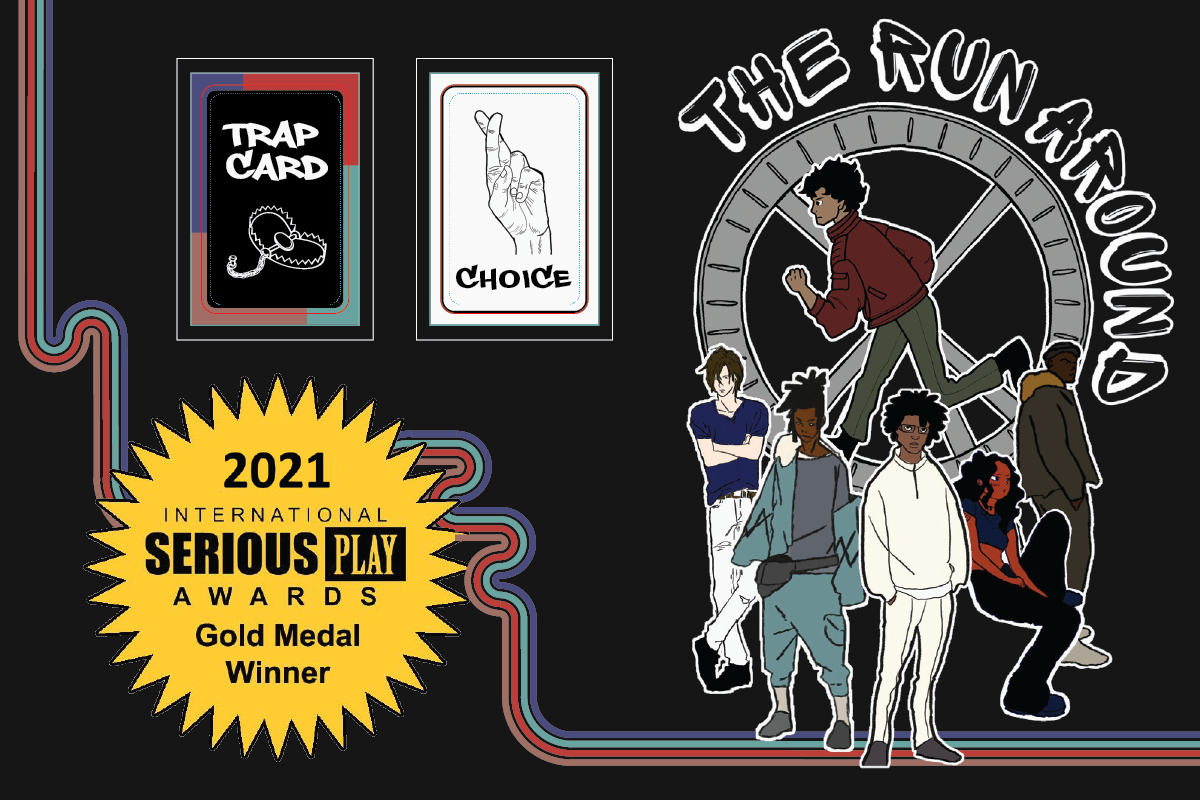
BOSTON—iThrive Games is pleased to announce that The Run Around, created by youth designers in partnership with iThrive; Janelle Ridley, Founder of Transition HOPE; AGNCY; Black Ministerial Alliance/Ten Point Coalition; and Dr. Beverley Cush Evans with Lesley University; won a gold medal in the category of Educational Tabletop Games in the 2021 International Serious Play Awards Program. The program honors outstanding commercial and student titles used for education or training.
Created from the lived experiences of the youth who designed it, The Run Around is focused on raising awareness about inequalities in the justice system. The designers sought to use their voice to shed understanding on the emotional, mental, and spiritual bondage the system creates, as they do not want others to fall into the same traps.
Staff members were inspired by the experience of working with the youth designers.
"The process of changing and dismantling unjust systems has to center the voices of those who have been impacted by it," said Susan E. Rivers, Ph.D., Executive Director and Chief Scientist at iThrive Games. "I'm proud of the youth designers who shared their stories, challenges, and triumphs and collaborated to create this game that will educate adults on their lived experiences."
The Run Around was developed to encourage empathy and change, with funding from the William T. Grant Foundation and the DN Batten Foundation. Game design and gameplay provide an opportunity to have important conversations around critical questions for designing systems that better support youth: how can systems help youth who are getting out of the justice system reintegrate successfully to stable living? How can we better understand young people's feelings, behaviors, and experiences to provide the structures, opportunities, and environments they need to thrive?
To learn more about the SEED Institute, which highlights youth designers, click here. Click here to read more information about the game design process.
###
Media Contact
Eghosa Asemota
eghosa.asemota[at]ithrivegames.org
ABOUT iTHRIVE GAMES
iThrive Games prepares teens to thrive by meeting them where they are and working in partnership towards a world where all have the voice, choice, and agency to reach their full potential. We use games and game design to equip teens with the social and emotional skills they need to be healthy and resilient.
Exploring Juvenile Justice and Mental Health with Teen Game Designers (Part 2)
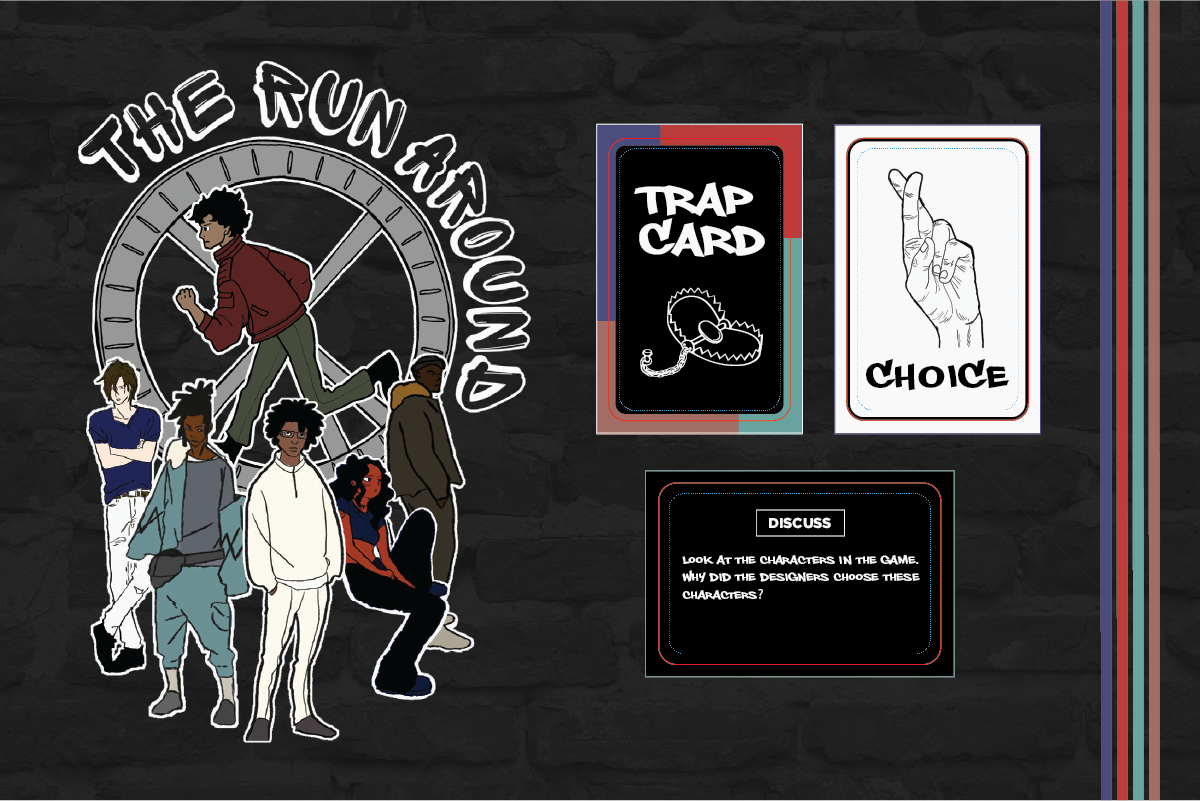
Part 1 of this series includes an overview of iThrive's Juvenile Justice System project and the framework for the Game Design Studio program. Click here to read Part 1.
It's called The Run Around. The goal of the board game is to be the first player to move all of your game pieces out of Maximum Security prison to Home. It's hard. It's frustrating. There are tons of setbacks. And it reflects the experiences of the youth designers who made it. The creative act, in the game design process, is part of how the designers cope with their experiences.
‟We tried to shape the game the way the justice system is," said K.C., one of the designers of The Run Around. ‟And we tried to base our directions and rules on what would happen in real life. One of them was like, when we are on parole or talk to our case worker, any little thing can get us put back into the predicament that we were in before. So we made the rules and regulations in the game to show that. It was to show how hard it is for you to get out."
While the subject matter was intense, K.C. found the design process enjoyable.
‟It was so fun," she said. ‟It was fun to see the finished product. It was fun making the rules and seeing other people get frustrated playing it [because our experience in the system is just as frustrating]. It was like when we were making the game, we were making it so people would get irritated because they wouldn't be able to win. And then seeing that they really did get mad. It was fun watching it become what it is now."
Another game designer was lit up by the aesthetic of the game.
‟I like the graphic designs of what we created," said R.D. "I like the clothes they have on. It looks very much like society right now."

K.C. agreed, saying, ‟They each have their own individuality."
Players advance their character through the game via the Choice cards. The Choice deck is stacked though. Only a few of the cards will actually allow you to leave prison. But watch out for traps! Landing on a Trap spot—and there are many—will cause you to move backward, lose a turn, or be sent back to prison.
R.D. sees the toughness of the game as a key design choice to add realism.
‟For guys who have been in jail, I feel like they can relate to it," he said. ‟A lot of stuff said in the scenarios in the game...it's realistic."
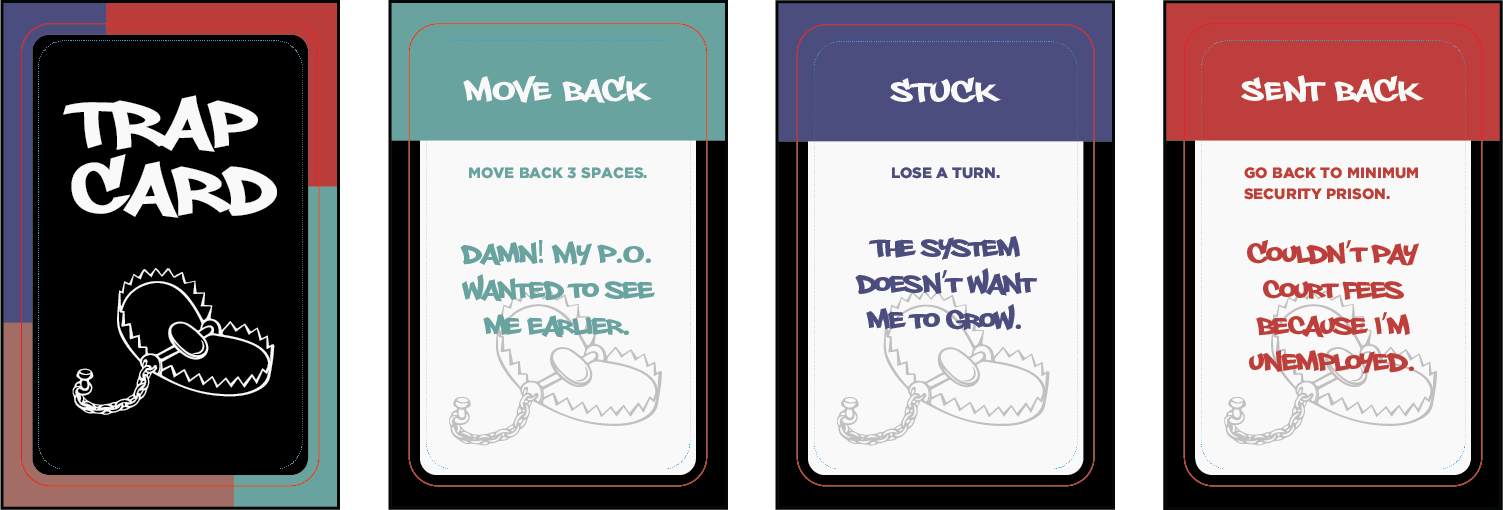
The game designers put a lot of intentionality into the design of the six characters, named Naomi, Marven, Jay, James, Ty, and Ace.
‟I created Marven," said M.A. "I relate a lot to Marven because my charge was similar. He gets caught up with friends and drugs and has to go to trial. People rat each other out."
For M.A, it wasn't just the circumstances that he channeled into the game. It was also the emotions.
‟The same thing with depression and anxiety happened to me while I was waiting for trial," he said.
And the final step of the game design process, which is to act, is set to happen over the next few months. The game designers will use The Run Around in workshops they are both designing and facilitating for stakeholders from the juvenile justice system in Boston beginning in May. They are also set to share their experiences at Games For Change this June. They are hoping that by sharing their experiences, decision makers can begin to create better support for youth who are system involved.

‟Anyone who goes through this has these feelings and the fact that it's a person of color doesn't make it any better," said M.A.
Exploring Juvenile Justice and Mental Health with Teen Game Designers (Part 1)
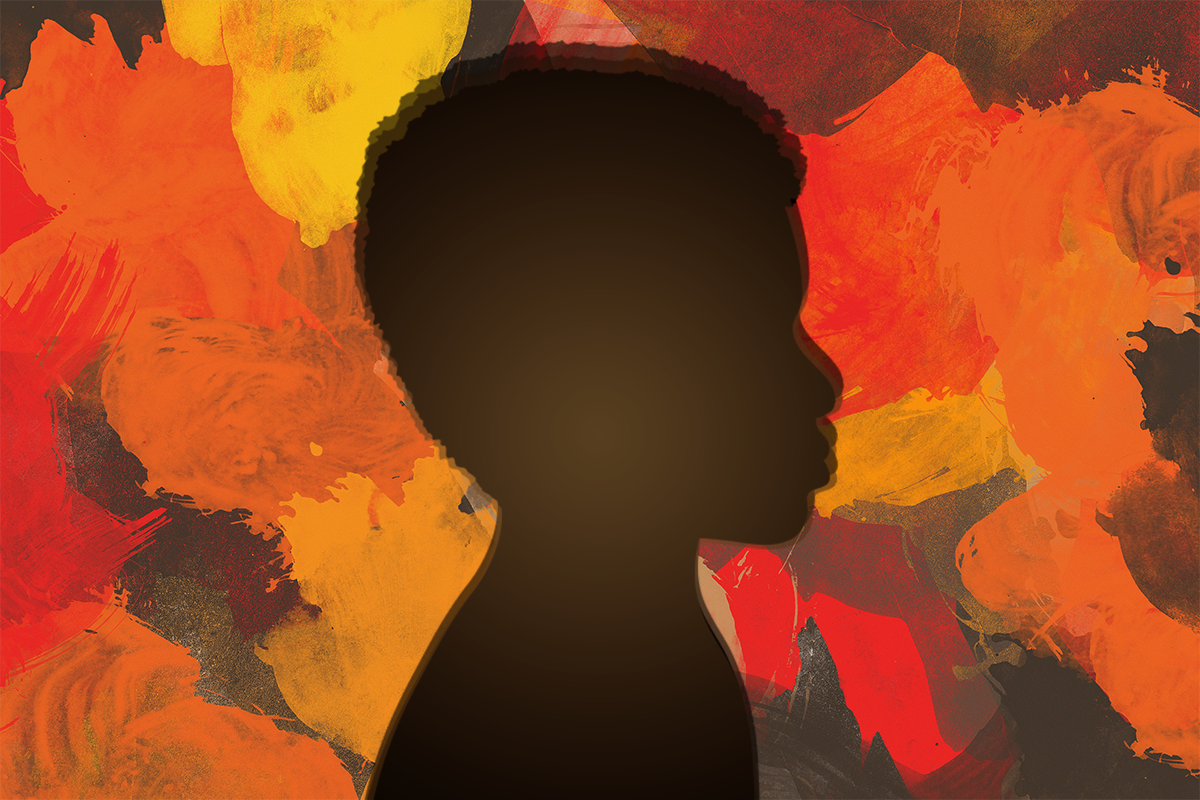
Since 2019, iThrive Games has been collaborating with partners to use games and game design to highlight the voices of Black youth involved with the juvenile justice system. Inequity in the provision of mental health services on the basis of race before, during, and after system involvement negatively impacts the health, well-being, employment opportunities, educational attainment, and relationships of individuals of color. Youth in our program use game design techniques to express their lived experiences with the justice system. They use the games they design to engage stakeholders in conversations about the inequities within the system and to identify how the systems could be improved to better meet the mental health needs of other young people who are subjected to the cradle-to-prison pipeline.
The current cohort of youth hails from Boston. The participants have been system involved at some point of their lives and now have a round of game development under their belts. For the purposes of this article, we'll use initials for the names of the participants.
These youth designers enhanced and completed a game called The Run Around, which was initially prototyped by an earlier cohort. The Run Around board game helps youth-serving adults and stakeholders understand how youth feel and explore opportunities to improve services and experiences for youth. The gameplay provides an opportunity to have important conversations around critical questions for supporting youth: how can we help youth who are getting out of the system reintegrate successfully to stable living? How can we better understand the feelings and behaviors young people grapple with to provide the support they need before being swept into the system, and while in the system?
The youth designers created this game using iThrive's "Surfacing-Coping-Acting" co-design cycle. The goal of this approach is to invite teens to raise up (surface) and work productively (cope and act) with the experiences that make adolescence both an incredible and vulnerable developmental stage.
"Social and emotional learning happens in community," said Susan Rivers, Executive Director and Chief Scientist of iThrive Games. "Belonging is key to our sense of wellbeing-especially so for teens as their brains continue to develop. Our co-design process not only supports well-being of the youth designers at this moment, but it also allows them to pay it forward by suggesting wellbeing supports for other youth who are involved with the system."
In the surfacing part of the design cycle, the youth designers shared some of the experiences they had when they were involved with the system. By sharing their experiences with each other, they validated one another's experiences and did the healing work listening and being listened to. Sharing difficult stories with others is one proven way to manage the discomfort and to challenge any fears that we're different or alone in our struggles.
K.C. shared what she thought was most important for people to understand about her experience.
"...It isn't easy at all. And we do go through struggles that we need help with," she said. "The world needs to know that the minority community goes through. It's sad that a lot of people in the world don't understand how messed up the justice system or school system is for minorities in the US today."
M.A. found that using his experience to design a game reinforced something he felt he already knew.
"It wasn't a surprise but when I saw it being implemented in the game, I thought, oh, that's dope," he said. "The only white character in the game starts off in minimum security. That was an insight...because he's white he goes in minimum not maximum."
"Game design has the power to help youth understand the systems that impact their lives," said Janelle Ridley, Founder of Transition HOPE. "In community, by sharing experiences and reflecting together, they can move toward how best to use their own agency to impact those systems."
The act of sharing and creating together offered an opportunity for social and emotional learning for the game designers.
"I knew it took a lot to make a game," said M.A. "It takes more than a lot. It takes everybody. Everyone brings a different skill. It takes a lot of teamwork. That's what I took away from the experience."
Part 2 of this series will explore the creation of the game and plans to share it with stakeholders.
iThrive’s Juvenile Justice System Project Fosters New Partnerships
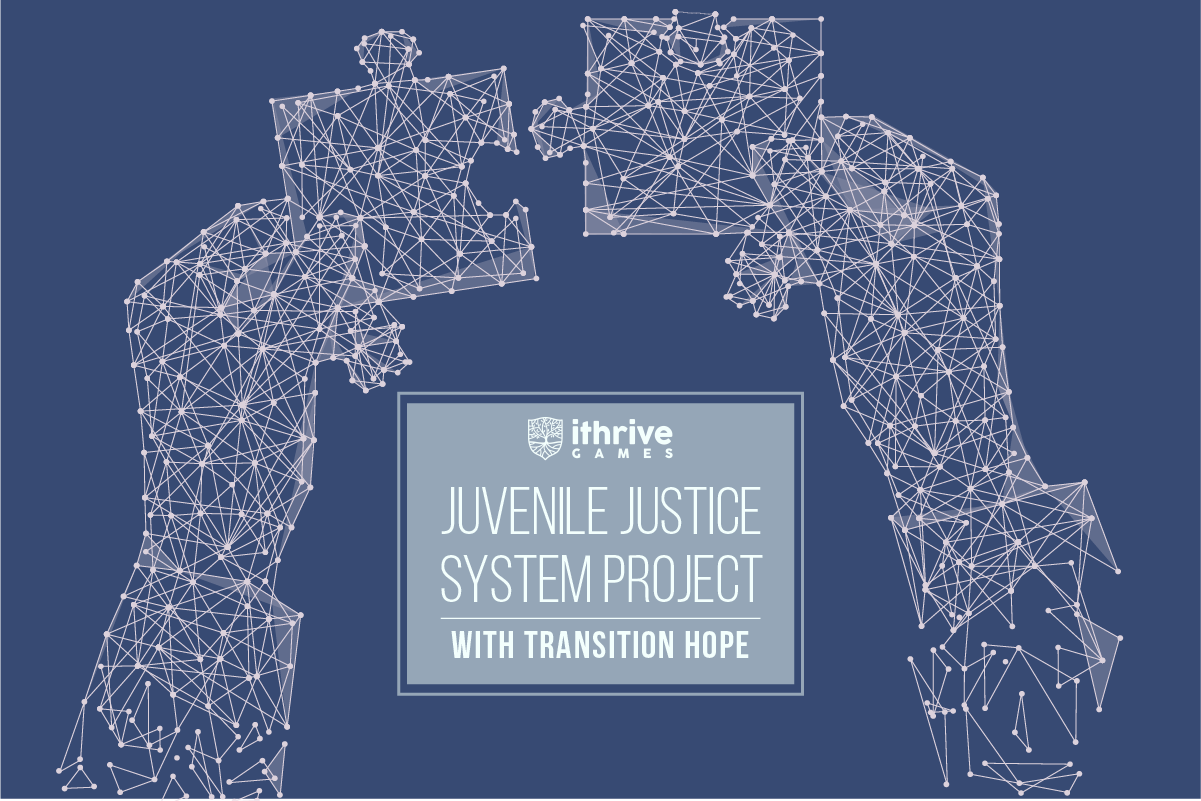
Racial disparities in the juvenile justice system continue to grow even as youth arrest rates decline overall, and black youth face particularly egregious disparities. Inequity in the provision of mental health services on the basis of race before, during, and after incarceration negatively impacts the health, well-being, employment opportunities, educational attainment, and relationships of individuals of color who are or were system-involved.
Last year, with a grant from William T. Grant Foundation, iThrive began setting the groundwork for a project to increase understanding of the lived experiences of youth of color within juvenile detention centers. The project was set to use iThrive's co-design approach, Game Design Studio, to authentically engage with youth and explore opportunities and barriers to supporting their mental health.
The COVID-19 pandemic hit just before the project was set to launch, disrupting the planned work. We could no longer work in-person with the youth; the detention centers were closed to all visitors indefinitely and travel restrictions were in place across the country. Staff explored and tested options for working with the young people at the chosen site in Georgia remotely, but the lack of reliable remote access and the nature of the work prohibited a distance approach.
After a few months of exploring other potential partners, staff found an excellent collaborator in Janelle Ridley. Bringing over 15 years of expertise to the project, Ms. Ridley currently sits on the Governor's Juvenile Justice Advisory Board and was previously a District Coordinator for System-Involved Youth for the Boston Public Schools where she worked with youth most impacted by the school-to-prison pipeline and sought to intentionally foster educational equity while actively working to dismantle the school-to-prison pipeline. Ms. Ridley is founder of Transition HOPE, a program intentionally designed for youth who are system-involved. Transition HOPE has been able to assist and bridge the needed resources for youth to continue moving forward. HOPE is an acronym for holding High Expectations for each and every young person; providing Opportunities that are realistic and within their perspective; helping the youth envision Pathways to Success by taking ownership of decisions for desired long-term outcomes; and providing Encouragement to help youth acknowledge that success is theirs to claim and define irrespective of the past.
In this new iteration of the project, iThrive staff will work closely with Ms. Ridley and a group of youth who will serve as Peer Leaders using our game design studio workshop model. Within the game design studio, peer leaders design games that draw from their lived experiences to think about the impacts of systems on their lives, and to imagine re-designed systems that would better support their well-being and mental health. In addition to designing games, peer leaders will build their facilitation skills and will lead meetings across the year with stakeholders, including other youth, city officials, educators, among others. In those meetings, peer leaders will use the games they design to launch discussions and explorations around systemic change, with particular focus on their lived experiences and on their well-being and mental health.
The peer leaders will work with youth stakeholders across multiple sessions using the game design studio approach, where the youth stakeholders will be invited to share their experiences in the system, iterate on the game designs to better reflect their needs and experiences, and then engage in conversations and game-play sessions with stakeholders.
"My goal is for those in positions of power and change to recognize that those with the lived experience are the experts, and they need to be at the forefront of change," said Ms. Ridley. "My hope is that these youth will see the value they are able to bring forth and although their journey has been those of trials, tribulations, and oppression, their journey is not over yet."
iThrive staff are grateful to Ms. Ridley and the youth for their partnership and also look forward to collaborating with AGNCY, a Boston-based nonprofit design firm that engages user-centered design to work with stakeholders toward systems change; and Beverley Evans, associate professor at the Graduate School of Education at Lesley University, who focuses much of her teacher training on building empathy amongst her students for young people and families most impacted by the school-to-prison pipeline.
"We are thrilled to have found partnerships to advance this important work," said Susan E. Rivers, PhD, Executive Director and Chief Scientist at iThrive Games. "We look forward to engaging with this group of young people in service of supporting youth-initiated systemic changes, changes that are long overdue."
Exploring Youth Experiences of the Juvenile Justice System in Boston
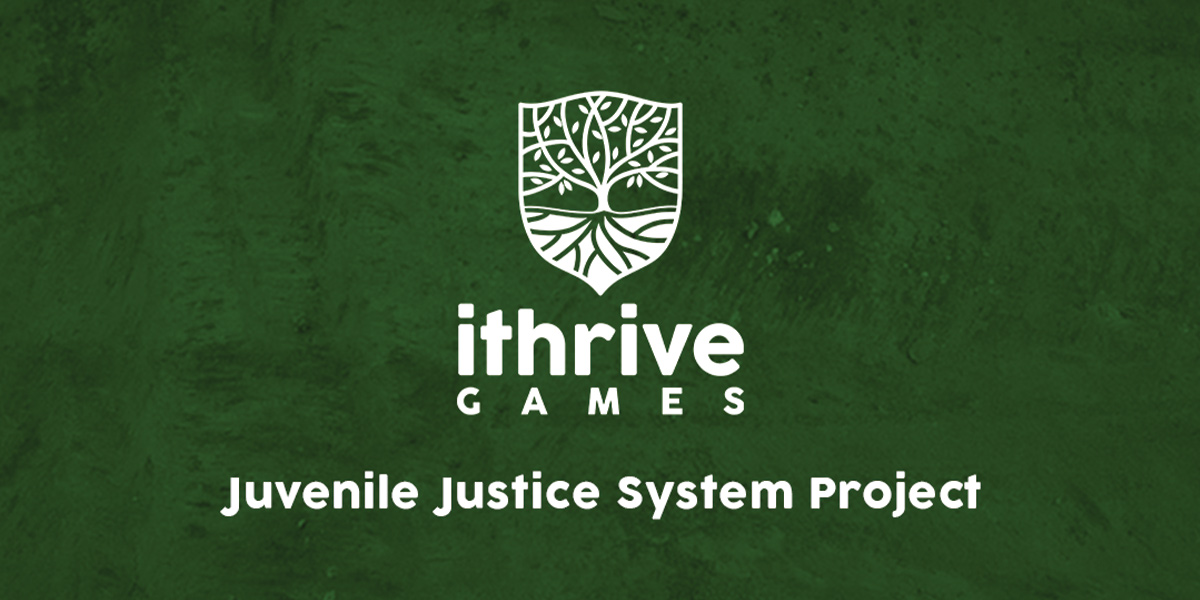
Youth arrests are at record lows, according to a report from the Office of Juvenile Justice and Delinquency Prevention. While this is good news, over 2 million young people remain involved with the juvenile justice system in the United States. The school-to-prison pipeline has serious consequences, particularly for youth of color. Black youth are more likely than youth of other races to be suspended from school and have early contact with the justice system, leading to consequences that affect their choices well beyond their teen years.
In the fall of 2019, iThrive Games Foundation embarked on a two-year journey to use games and game design to give voice to Black youth involved with the juvenile justice system. Funded by the WT Grant Foundation, iThrive will co-design games with youth in detention in Atlanta to give expression to young people's experiences with the justice system. As an initial foray into this work, the team began testing materials and activities in Boston, where team members were located, learning from staff and stakeholders in the area.
Working with Janelle Ridley from the Boston Mayor's Office, we offered gameplay and game design sessions to a group of young men on the Peace Unit in Suffolk County House of Corrections. We also convened an advisory group of youth with experiences in the justice or foster care system. Each of these groups played together, explored their experiences with youth-serving systems, and designed their own original games to express their experiences to stakeholders.
Young men on the Peace Unit shared stories of the pathways that they had taken through adolescence. The 18- to 24-year-olds explored inflection points in their lives that moved them along a trajectory away from friends, families, or goals. They also discussed the emotional drivers that impacted their decision making. These discussions were gamified in a variety of ways-from a life map drawing activity to the creation of a half-dozen game ideas. During our time together, we finished three-game prototypes that captured the nuanced, thoughtful discussions, and important insights about how it feels to travel a path in the school to prison pipeline.
The youth created games such as Myths and Facts of the Juvenile Justice System, a memory-type matching game where players pair misconceptions the young men had heard along with the difficult realities of life in the system. They created an unnamed game that focused on different definitions of success and the nonlinear pathway to meeting life goals, littered with obstacles ranging from bad choices to systemic inequality.
Finally, they created Klout, a board game where players move along colorful pathways collecting stars and trees to get to the end, hoping to avoid stuff-stealing crabs along the way. A second game board reveals that the colorful pathways mirror the young men's experiences and the tangled pathways open to them, all with prizes and pitfalls. The game asks players to explore their emotional drivers—risk-taking, self-sabotage, power, need, respect, security, and frustration all affect choices and the response to environments without choice.
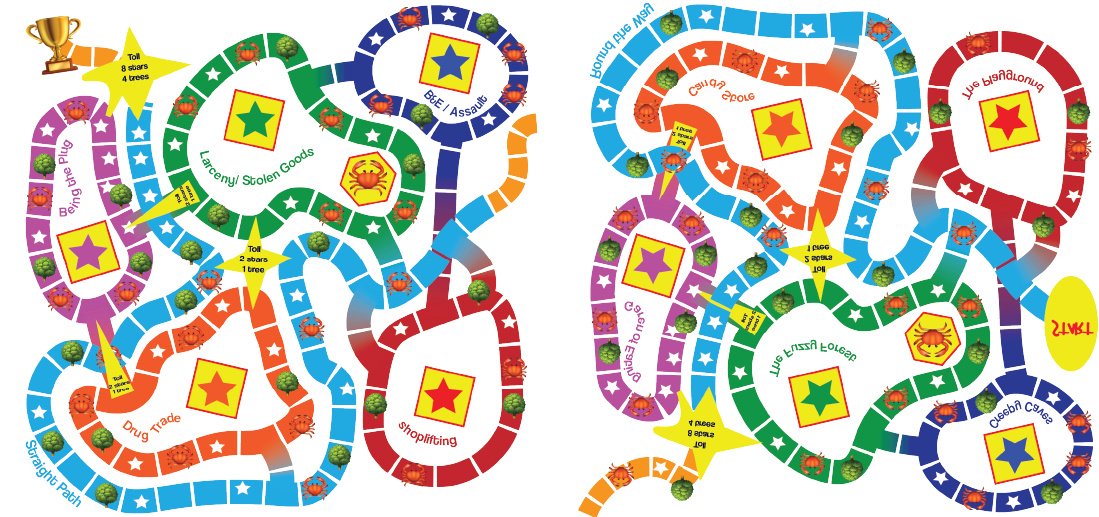
Klout, a board game where players move along colorful pathways collecting stars and trees to get to the end, hoping to avoid stuff-stealing crabs along the way.
In the youth advisory group we worked with young people who were living and working in the community, but previously had contact with the justice and foster care system. Now living in the community, these youth focused on the challenges of going home, moving homes, and finding the stability to work towards their goals. Getting out of detention is the first step to rebuilding, but not the last—there's still finding a home, a job, and accessing education while navigating challenging rules and difficult family dynamics.
Through gameplay and game design, the group was able to translate those difficulties into a game called The Runaround. Similar in play to the classic game Sorry, players navigate a series of pieces through the levels of security to get out of detention. But they're not free until they move around the board, passing potential pitfalls and unexpected challenges like paying probation fees without a job or needing an address to stay out of the system when housing isn't stable. Spoiler alert: you are likely to feel pretty frustrated during this game and generally no one wins.

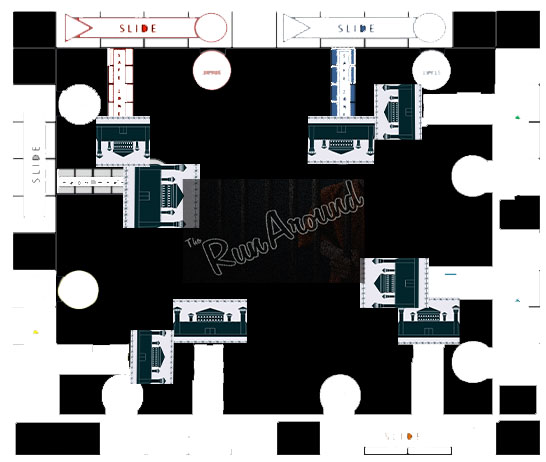
The Runaround, a board game where players navigate a series of pieces through the levels of security to get out of detention.
Like the Klout game from the Peace Unit, The Runaround helps youth-serving adults and stakeholders understand how youth feel and explore opportunities to improve services and experiences for youth. The gameplay also provides an opportunity to have important conversations around critical questions for supporting youth: how can we help youth who are getting out of the system reintegrate successfully to stable living? How can we better understand the feelings and behaviors young people grapple with to provide the support they need before being swept into the school-to-prison pipeline?
The games young people created with us were creative, engaging, and playable. Most importantly, the games provided a space for us to hear the voice of youth that too often is unheard in conversations about juvenile justice reform. Throughout 2020, iThrive will continue this important work in Georgia where recent work in juvenile justice reform can give us a lens into new approaches. iThrive will generate research about best practices around the mental health of Black youth involved in the system. Be on the lookout for our reports from the field, and stay engaged in your own communities' efforts at justice reform.
iThrive’s Juvenile Justice System Project Aims to Support Black Youth

This year, we'll be collaboratively working with young people who've been impacted by the juvenile justice system to amplify and understand their stories in order to create systems that better serve them and their communities.
At the core of our work at iThrive Games is our belief that solutions to social challenges lie with the people who experience them firsthand. That is why we are fiercely committed to co-designing with teens.
We recognize the brilliance of the teenage mind and the power of each teen's voice. Whether we are co-creating a game design experience, playtesting a new game, or trying out a new game-based curriculum, teens have a seat at our table and are always ready and willing to tap into their experiences and co-design with us.
Earlier this year, we began thinking about how we can apply iThrive's co-design model to the juvenile justice system.
The juvenile justice system, as we know it, is riddled with deep racial inequity. Black youth, who account for 16 percent of America's adolescent population, make up 40 percent of the youth committed to juvenile detention facilities, and from 2003 to 2013, although overall arrests fell, Black and white disparities in juvenile detention grew by 15 percent.
The inequity is also seen in who within the juvenile justice system gets access to mental health care services. Nationwide, Black youth involved in the juvenile justice system are half as likely to be screened for mental health issues and Black males are 32 percent less likely to receive psychiatric care than white males. Research shows that inequity in the provision of mental health services based on race before, during, and after incarceration, negatively impacts the health, well-being, employment opportunities, educational attainment, and relationships of individuals of color who are or were system-involved. In other words, insufficient mental healthcare has lasting implications.
Despite how impacted Black youth are by the juvenile justice system, there is little to no research on their perspectives and ideas about how it can be improved. We want to help change that; specifically in the area of mental health.
Thanks to a grant from the William T. Grant Foundation, we are undertaking a project to increase our collective understanding of the lived experiences of Black youth within juvenile detention centers. The project uses iThrive's co-design approach to authentically engage with youth who have been impacted by the juvenile justice system, identify barriers, and explore opportunities to support their mental health within "the system."
We will invite approximately 40 Black youth (ages 13-25 years) who are detained in Georgia to participate in a series of design sessions with us. Working with each other and with workshop facilitators, youth will draw on their experiences with mental health in the juvenile justice system in service of contributing their voices to game prototypes designed to raise awareness among adult stakeholders and motivate action in the community to better meet their mental health needs.
As part of our evolved vision, we see a world where there is equal opportunity open to all and where teens from traditionally marginalized communities have the space to share their ideas and their stories. We are committed to doing all that we can to amplify the voices and experiences of youth most impacted by the juvenile justice system so that they have what they need to thrive. Over the next year, we'll provide updates about the insights the young people share. Sign up for our newsletter to learn more.
